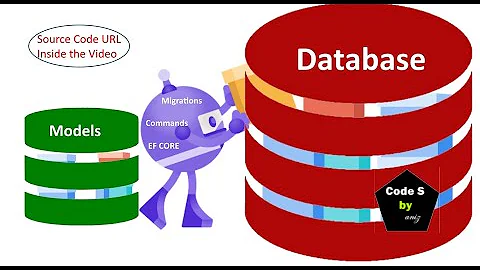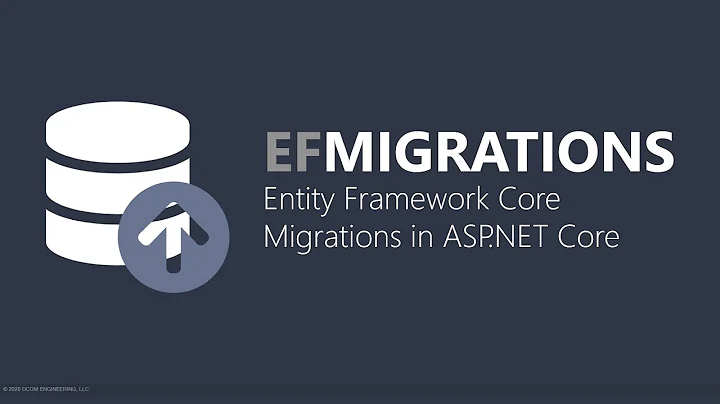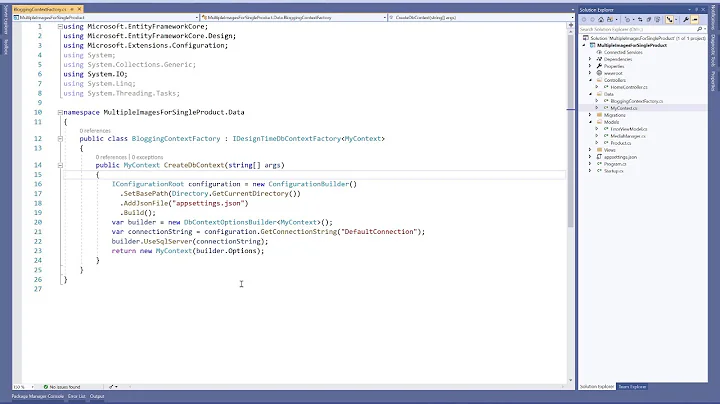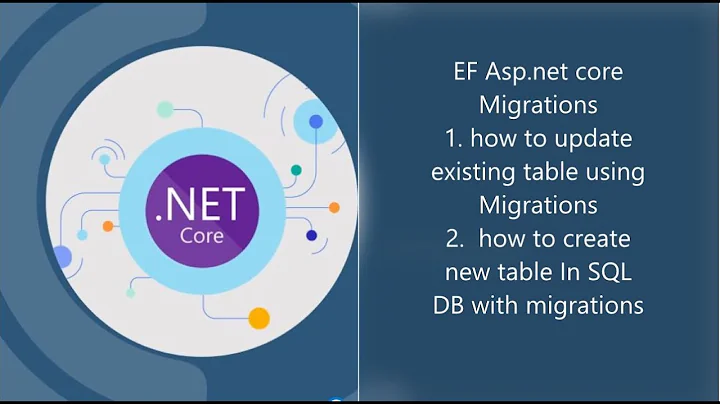Unable to create migrations after upgrading to ASP.NET Core 2.0
Solution 1
You can add a class that implements IDesignTimeDbContextFactory inside of your Web project.
Here is the sample code:
public class DesignTimeDbContextFactory : IDesignTimeDbContextFactory<CodingBlastDbContext>
{
public CodingBlastDbContext CreateDbContext(string[] args)
{
IConfigurationRoot configuration = new ConfigurationBuilder()
.SetBasePath(Directory.GetCurrentDirectory())
.AddJsonFile("appsettings.json")
.Build();
var builder = new DbContextOptionsBuilder<CodingBlastDbContext>();
var connectionString = configuration.GetConnectionString("DefaultConnection");
builder.UseSqlServer(connectionString);
return new CodingBlastDbContext(builder.Options);
}
}
Then, navigate to your Database project and run the following from command line:
dotnet ef migrations add InitialMigration -s ../Web/
dotnet ef database update -s ../Web/
-s stands for startup project and ../Web/ is the location of my web/startup project.
Solution 2
No need for IDesignTimeDbContextFactory.
Run
add-migration initial -verbose
that will reveal the details under
An error occurred while accessing the IWebHost on class 'Program'. Continuing without the application service provider.
warning, which is the root cause of the problem.
In my case, problem was, having ApplicationRole : IdentityRole<int> and invoking services.AddIdentity<ApplicationUser, IdentityRole>() which was causing below error
System.ArgumentException: GenericArguments[1], 'Microsoft.AspNetCore.Identity.IdentityRole',
on 'Microsoft.AspNetCore.Identity.EntityFrameworkCore.UserStore`9[TUser,TRole,TContext,
TKey,TUserClaim,TUserRole,TUserLogin,TUserToken,TRoleClaim]' violates the constraint of type 'TRole'.
---> System.TypeLoadException: GenericArguments[1], 'Microsoft.AspNetCore.Identity.IdentityRole',
on 'Microsoft.AspNetCore.Identity.UserStoreBase`8[TUser,TRole,TKey,TUserClaim,
TUserRole,TUserLogin,TUserToken,TRoleClaim]' violates the constraint of type parameter 'TRole'.
Solution 3
Solution 1: (Find the problem in 99% of cases)
Set Web Application project as Startup Project
Run the following commands with -verbose option.
Add-Migration Init -Verbose
-verboseoption helps to actually uncover the real problem, It contains detailed errors.
Solution 2:
Rename BuildWebHost() to CreateWebHostBuilder(), because Entity Framework Core tools expect to find a CreateHostBuilder method that configures the host without running the app.
.NET Core 2.2
public class Program
{
public static void Main(string[] args)
{
CreateWebHostBuilder(args).Build().Run();
}
public static IWebHostBuilder CreateWebHostBuilder(string[] args) =>
WebHost.CreateDefaultBuilder(args)
.UseStartup<Startup>();
}
.NET Core 3.1
Rename BuildWebHost() to CreateHostBuilder()
public class Program
{
public static void Main(string[] args)
{
CreateHostBuilder(args).Build().Run();
}
public static IHostBuilder CreateHostBuilder(string[] args) =>
Host.CreateDefaultBuilder(args)
.ConfigureWebHostDefaults(webBuilder =>
{
webBuilder.UseStartup<Startup>();
});
}
Solution 3:
Make sure you added Dbcontext to dependency injection:
AddDbContext<TContext> will make both your DbContext type, TContext, and the corresponding DbContextOptions<TContext> available for injection from the service container.
This requires adding a constructor argument to your DbContext type that accepts DbContextOptions<TContext>.
Example: In Startup.cs
public void ConfigureServices(IServiceCollection services)
{
services.AddDbContext<AppDbContext>(options => options.UseSqlServer(connectionString));
}
AppDbContext code:
public class AppDbContext: DbContext
{
public AppDbContext(DbContextOptions<AppDbContext> options)
:base(options)
{ }
}
Solution 4
public class Program
{
public static void Main(string[] args)
{
BuildWebHost(args).Run();
}
public static IWebHost BuildWebHost(string[] args) =>
WebHost.CreateDefaultBuilder(args)
.UseStartup<Startup>()
.Build();
}
}
Just rename BuildWebHost() to CreateWebHostBuilder(), because migrations use this method by default.
Solution 5
In my case, the cause of the problem was multiple startup projects. I have three projects in my solution: Mvc, Api, and Dal. DbContext and Migrations in the Dal project.
I had configured multiple startup projects. Both Mvc and Api projects were running when I clicked Start. But in this case I was getting this error.
"Unable to create an object of type 'MyContext'. Add an implementation of 'IDesignTimeDbContextFactory' to the project, or see https://go.microsoft.com/fwlink/?linkid=851728 for additional patterns supported at design time."
I could successfully add migration after setting Mvc as the only startup project and selecting Dal in the Package Manager Console.
Related videos on Youtube
ruhm
Updated on January 28, 2021Comments
-
ruhm over 3 years
After upgrading to ASP.NET Core 2.0, I can't seem to create migrations anymore.
I'm getting
"An error occurred while calling method 'BuildWebHost' on class 'Program'. Continuing without the application service provider. Error: One or more errors occurred. (Cannot open database "..." requested by the login. The login failed. Login failed for user '...'"
and
"Unable to create an object of type 'MyContext'. Add an implementation of 'IDesignTimeDbContextFactory' to the project, or see https://go.microsoft.com/fwlink/?linkid=851728 for additional patterns supported at design time."
The command I previously ran was
$ dotnet ef migrations add InitialCreate --startup-project "..\Web"(from the project/folder with the DBContext).Connection string:
"Server=(localdb)\\mssqllocaldb;Database=database;Trusted_Connection=True;MultipleActiveResultSets=true"This is my Program.cs
public class Program { public static void Main(string[] args) { BuildWebHost(args).Run(); } public static IWebHost BuildWebHost(string[] args) => WebHost.CreateDefaultBuilder(args) .UseStartup<Startup>() .Build(); }-
Miguel Torres C over 6 yearsPossibly the problem is not in Program.cs. It is probably the use of an instruction to load seed data at the end of your Configure method: DbInitializer.Initialize (context); If you have that instruction, comment it: //DbInitializer.Initialize(context); Then run the Migration instructions to test. If the problem arises, then follow up on the DbInitializer.cs class.
-
 Orhun over 6 yearsIs your MyContext class in another class library project?
Orhun over 6 yearsIs your MyContext class in another class library project? -
iBoonZ over 6 yearsSame issue here, context is in other library. If id add an parameter less consturctor to the context, migrations are working, but with the same error: (An error occurred while calling method 'BuildWebHost' on class 'Program'. Continuing without the application service provider. Error: Object reference not set to an instance of an object. )
-
Konrad Viltersten over 6 yearsDid you get it resolved in the end?
-
 Amit Philips almost 6 years@MiguelTorresC thanks for that comment. I commented out my Seeding Methods and Migrations began to work again. Thanks a ton !!!
Amit Philips almost 6 years@MiguelTorresC thanks for that comment. I commented out my Seeding Methods and Migrations began to work again. Thanks a ton !!! -
 Darleison Rodrigues over 5 yearsCheck in Startup.cs if there a line with
Darleison Rodrigues over 5 yearsCheck in Startup.cs if there a line withservice.DbContext<YourContext>. If not add and try to make a migration.
-
-
ruhm over 6 yearsI'm using
<PackageReference Include="Microsoft.AspNetCore.All" Version="2.0.0" />which includes that reference. I tried also including the above, but no change. -
Reft over 6 yearsI'm getting: The configuration file 'appsettings.json' was not found and is not optional. The physical path is 'C:\Users\XXX\Documents\Visual Studio 2017\Projects\XXX\src\XXX.Api\bin\Debug\netcoreapp2.0\appsettings.json'. My appsettings is in C:\Users\XXX\Documents\Visual Studio 2017\Projects\XXX\src\XXX.Api.
-
Reft over 6 yearsI'm still getting: Add an implementation of 'IDesignTimeDbContextFactory<DatabaseContext>'......
-
Serg over 6 yearsThanks, this helped me too.
-
 DaImTo over 6 yearsMake sure you have the appsettings.json file set to copy local should fix the issue with it not being found
DaImTo over 6 yearsMake sure you have the appsettings.json file set to copy local should fix the issue with it not being found -
 hellow over 5 yearsWhile this might answer the authors question, it lacks some explaining words and links to documentation. Raw code snippets are not very helpful without some phrases around it. You may also find how to write a good answer very helpful. Please edit your answer.
hellow over 5 yearsWhile this might answer the authors question, it lacks some explaining words and links to documentation. Raw code snippets are not very helpful without some phrases around it. You may also find how to write a good answer very helpful. Please edit your answer. -
Train over 5 yearsThis is weird, the command
add-migration initialthrew the error no dbcontext found but when I ranadd-migration initial -verboseit worked perfectly. I didn't make any code changes just changed the command. Any idea why? -
 tchelidze over 5 years@OrthoHomeDefense well, that's really weird. I expect
tchelidze over 5 years@OrthoHomeDefense well, that's really weird. I expect-verboseto expose the underlying error details. Not really sure why it fixed an error. -
Banoona over 5 yearsThis solution introduces a dependency on Entity Framework into your host application (in my case this is a Web project). Is there any way to get around this? I would like my Repository library to hold the EF stuff, and not introduce EF into the web app.
-
sudhakarssd over 5 yearsYes -Verbose helps to actually uncover the real problem. In my case haven't added AddDbContext services to startup.
-
Jon Koivula about 5 yearsHmm for me add-migration initial worked. How come it worked while using dotnet ef migrations add initial did not?
-
zola25 about 5 yearsThis worked for me. Changed the BuildWebHost function in Program.cs from
public static IWebHostBuilder BuildWebHost(string[] args)topublic static IWebHost BuildWebHost(string[] args)with the.Build()now included in the function -
barbara.post about 5 yearsdotnet ef migrations add InitialCreate --verbose
-
barbara.post about 5 yearsDespite this is the accepted answer, this one is better: stackoverflow.com/a/52671330/1737395 Indeed, running the migration with --verbose flag helps greatly
-
 Tiago Ávila about 5 years@tchelidze Thank you for that, in my case I didn't have a parameterless constructor in my ApplicationDbContext.
Tiago Ávila about 5 years@tchelidze Thank you for that, in my case I didn't have a parameterless constructor in my ApplicationDbContext. -
 KEMBL almost 5 yearsGuys, if you are using ASP.NET Core 2.1+ you BuildWebHost method will have a different name - CreateWebHostBuilder because of docs.microsoft.com/en-us/aspnet/core/migration/… so rename CreateWebHostBuilder to BuildWebHost and migration will find BuildWebHost and take DbContext from it.
KEMBL almost 5 yearsGuys, if you are using ASP.NET Core 2.1+ you BuildWebHost method will have a different name - CreateWebHostBuilder because of docs.microsoft.com/en-us/aspnet/core/migration/… so rename CreateWebHostBuilder to BuildWebHost and migration will find BuildWebHost and take DbContext from it. -
user3012760 almost 5 yearsThank you, the only solution that worked for me was to set the web project as startup project and that is exactly what needed to be done.
-
Chaim Eliyah almost 5 yearsWHAT. This should be advertised on every page dealing with this issue are you serious. Instant success. Thank you.
-
Ľuboš Pilka almost 5 yearsThank you, kind of same thing happened to me. I had to change startup project to the place where Startup/Program classes exists. The error message is a bad joke.
-
upkit almost 5 yearsOutput messages were really frustrating. I had no startup project selected, unexpectedly. This was the reason why dbContext could not be created. Thanks.
-
Azri Zakaria almost 5 yearsThanks mate, Solved after spend 2 hours to configure without using
IDesignTimeDbContextFactory -
D Todorov over 4 yearsSave my day !!! It is very strange error. I`m using .net core 3.0 with preview 7 and this error stil exist
-
 sherox over 4 years@DTodorov read this devblogs.microsoft.com/dotnet/…
sherox over 4 years@DTodorov read this devblogs.microsoft.com/dotnet/… -
 Sergey_T over 4 yearsThanks for "-Verbose" flag. It has helped me to find the root cause of the exception.
Sergey_T over 4 yearsThanks for "-Verbose" flag. It has helped me to find the root cause of the exception. -
Naveed Khan over 4 yearsThanks you sir ... A lot of my time is saved
-
 Ali Bayat over 4 yearsD Todorov Just rename BuildWebHost() to CreateHostBuilder()
Ali Bayat over 4 yearsD Todorov Just rename BuildWebHost() to CreateHostBuilder() -
 Avrohom Yisroel over 4 yearsThis is a fantastic tip, should be the accepted answer
Avrohom Yisroel over 4 yearsThis is a fantastic tip, should be the accepted answer -
 WernerCD over 4 yearsI'm using a Worker as a base and ran into this with Verbose:
WernerCD over 4 yearsI'm using a Worker as a base and ran into this with Verbose:No static method 'CreateHostBuilder(string[])' was found on class 'Program'.. I had moved stuff around and renamed things - it recognized the CreateHostBuilder. For what it's worth... docs.microsoft.com/en-us/aspnet/core/fundamentals/host/… -
 sherox over 4 years@WernerCD Cuz Worker uses CreateHostBuilder() method that implements IHostBuilder of Net Core 3
sherox over 4 years@WernerCD Cuz Worker uses CreateHostBuilder() method that implements IHostBuilder of Net Core 3 -
 WernerCD over 4 years@sherox Yeah, my point being simply that this answer says "you need static CreateWebHostBuilder()" - the same applies to the console application. You need "static CreateHostBuilder()" method. This answer got me in that direction. I had "rearranged" things so that wasn't present.
WernerCD over 4 years@sherox Yeah, my point being simply that this answer says "you need static CreateWebHostBuilder()" - the same applies to the console application. You need "static CreateHostBuilder()" method. This answer got me in that direction. I had "rearranged" things so that wasn't present. -
 Sarah over 4 yearsThank you so much, this helped me find my problem and solve it. In my case, it was a "No parameterless constructor defined for type 'Data.Access.DAL.MainDbContext'.", and therefore, I just removed the parameters from the constructor and it worked like magic!
Sarah over 4 yearsThank you so much, this helped me find my problem and solve it. In my case, it was a "No parameterless constructor defined for type 'Data.Access.DAL.MainDbContext'.", and therefore, I just removed the parameters from the constructor and it worked like magic! -
Adam Carr about 4 yearsFor reference this should be the way to solve the issue. I found out exactly what the issue was with my error.
-
 David Klempfner over 3 yearsI got The term 'add-migration' is not recognized. Just adding --verbose to $ dotnet ef migrations worked for me.
David Klempfner over 3 yearsI got The term 'add-migration' is not recognized. Just adding --verbose to $ dotnet ef migrations worked for me.






